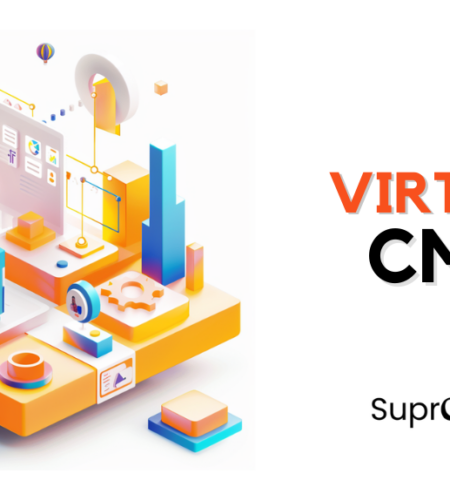
As AI technology advances, so do virtual chief marketing officers (CMOs) roles and responsibilities. Virtual CMOs are evolving to become more data-driven, adaptive, and efficient, with AI playing a vital role in this transformation.
One of the primary ways AI impacts virtual CMOs is by changing the nature of their decision-making processes. Rather than relying on intuition or gut instinct, virtual CMOs can now leverage AI-driven insights to make data-driven decisions. This can lead to more targeted and effective marketing campaigns better aligned with customer preferences and market trends.
Another way AI is changing the responsibilities of virtual CMOs is by automating routine tasks, such as reporting, data analysis, and even some aspects of content creation.
The impact of AI on the role and responsibilities of Virtual Chief Marketing Officers (CMOs) is significant and multifaceted. As AI technology advances, it brings challenges and opportunities in the marketing domain. Here are some key impacts:
Data-Driven Decision Making: AI enables Virtual CMOs to leverage vast data to make informed decisions. They can use AI tools for market research, consumer behavior, and competitive analysis, leading to more strategic and data-driven marketing plans.
Personalization at Scale: AI allows for hyper-personalized marketing campaigns that can be scaled across diverse customer segments. Virtual CMOs can use AI to tailor marketing messages, offers, and content to individual preferences, enhancing customer engagement and conversion rates.
Efficiency and Automation: AI-driven automation tools can handle repetitive and time-consuming tasks such as email marketing, social media posting, and ad placements. This frees up Virtual CMOs to focus on strategic planning and creative marketing aspects that require human insight.
Predictive Analytics: AI’s predictive capabilities enable Virtual CMOs to forecast trends, demand, and customer behavior more accurately. This helps in proactive planning and optimizing marketing strategies for future market conditions.
Content Creation and Optimization: AI tools can assist in content creation, from generating ideas to optimizing content for search engines and user engagement. This ensures that content strategies are creative and data-backed for maximum effectiveness.
Enhanced Customer Experience: AI can improve customer experiences through chatbots, personalized recommendations, and interactive platforms. Virtual CMOs can use these tools to enhance brand interactions, customer service, and overall customer satisfaction.
Ethical and Privacy Considerations: With the increased use of AI, Virtual CMOs must navigate ethical considerations and privacy regulations such as GDPR. Ensuring AI is used responsibly and transparently is crucial in maintaining customer trust and compliance.
Redefining the Virtual CMO: How AI is Transforming the Role
AI technology is redefining the role of the virtual CMO, acting as a catalyst for transformation. Virtual CMOs are becoming more data-driven, adaptive, and efficient, with AI enabling more targeted and effective marketing campaigns and automating routine tasks.
As AI technology advances, the role of the virtual CMO will continue to evolve, with AI shaping the future of marketing leadership. Businesses that embrace AI-powered virtual CMOs can stay ahead of the curve and drive success in the digital age.
From Strategy to Execution: AI’s Influence on Virtual CMO Responsibilities
AI is making its mark on the responsibilities of virtual CMOs, extending from strategic planning to tactful execution. Virtual CMOs are evolving to become more data-driven and efficient, with AI enabling more targeted and effective marketing campaigns.
From automating routine tasks to providing valuable insights for decision-making, AI is reshaping how virtual CMOs operate and deliver value to businesses. As AI technology advances, it will continue to influence the responsibilities of virtual CMOs, shaping the future of marketing leadership. Businesses that embrace AI-powered virtual CMOs can stay ahead of the curve and drive success in the digital age.
Virtual CMO 2.0: Leveraging AI to Drive Marketing Success
In today’s digital age, businesses seek new ways to drive success and stay ahead of the competition. One emerging trend gaining traction is using virtual CMOs, or Chief Marketing Officers, powered by AI technology. Virtual CMOs offer businesses various benefits, from data-driven insights and increased efficiency to more effective marketing campaigns.
As AI technology advances, virtual CMOs become more sophisticated and integrated into marketing. This has led to the emergence of what can be called “Virtual CMO 2.0” – a new generation of AI-powered marketing leadership redefining how businesses approach marketing.
Virtual CMO 2.0 leverages AI technology to provide businesses with a comprehensive suite of marketing capabilities, from strategic planning and campaign management to data analysis and optimization. By integrating AI into the virtual CMO role, businesses can benefit from enhanced insights, increased efficiency, and targeted marketing campaigns.
Navigating the AI Revolution: How Virtual CMOs are Adapting
The rise of AI is transforming the marketing landscape, and virtual CMOs are at the forefront of this revolution. As businesses seek to stay ahead of the competition, they turn to virtual CMOs to provide data-driven insights, automate routine tasks, and develop targeted marketing campaigns. However, virtual CMOs must adapt as AI evolves to stay relevant and practical.
One key way virtual CMOs are adapting to the AI revolution is by developing a deeper understanding of the technology and how it can be used to drive marketing success. This includes understanding the different types of AI, such as machine learning and natural language processing, and how they can be used to analyze customer data, identify trends, and develop personalized marketing campaigns.
Another way virtual CMOs are adapting to the AI revolution is by embracing new tools and technologies that incorporate AI.
As virtual CMOs adapt to the AI revolution, they will be better equipped to help businesses navigate the changing marketing landscape and achieve their goals.
The AI Advantage: How Virtual CMOs Excel in a Data-Driven World
Virtual CMOs, or Chief Marketing Officers, are rising to the challenge by leveraging AI technology to gain an edge in the data-driven world.
One key advantage of virtual CMOs is their ability to analyze large amounts of data in real time.
Virtual CMOs use AI to identify patterns and trends in customer behavior, market trends, and competitive analysis, providing businesses with actionable insights to inform their marketing strategies.
This allows virtual CMOs to create highly targeted and personalized marketing campaigns more likely to resonate with customers and drive engagement and conversions.
Another advantage of virtual CMOs is their ability to automate routine tasks like reporting, data analysis, and content creation.
AI-Powered Insights: Enhancing Decision-Making for Virtual CMOs
Virtual CMOs allow businesses to leverage AI technology to analyze large amounts of data in real time, providing valuable insights into customer behavior, market trends, and competitive analysis.
One of the critical ways virtual CMOs use AI to enhance decision-making is by using predictive analytics.
By analyzing customer purchase histories, browsing patterns, and social media interactions, virtual CMOs can develop predictive models to help businesses identify customer preferences and predict future trends. This information can then be used to create targeted marketing campaigns and pricing strategies that likely to resonate with customers and drive conversions.
Another way virtual CMOs use AI to enhance decision-making is by using natural language processing (NLP) to analyze customer feedback and sentiment.
Embracing the Virtual CMO-Chatbot Alliance: The Power of AI
The rise of virtual CMOs and chatbots has created a powerful alliance forming how businesses approach marketing. By combining the insights and capabilities of virtual CMOs with the conversational abilities of chatbots, companies can create a seamless and personalized customer experience that drives engagement and conversions.
One of the key benefits of the virtual CMO-chatbot alliance is the ability to provide personalized recommendations and offers to customers in real time. Virtual CMOs can analyze customer purchase histories, browsing patterns, and social media interactions to develop a deep understanding of customer preferences and behaviors. This information can then be used to create personalized offers and recommendations more likely to resonate with customers.
Conclusion:
The impact of AI on the role and responsibilities of virtual CMOs is significant, marking a paradigm shift in marketing leadership. Virtual CMOs are evolving to become more data-driven, adaptive, and efficient, with AI playing a vital role in this transformation.
From changing decision-making processes to automating routine tasks and enabling more targeted and effective marketing campaigns, AI is reshaping how virtual CMOs operate and deliver value to businesses. As AI technology advances, the role and responsibilities of virtual CMOs will likely continue to evolve, with AI playing an increasingly important role in shaping the future of marketing leadership.
The Impact of AI on the Role and Responsibilities of Virtual CMOs: FAQs
How Is AI Transforming The Role Of Virtual CMOs?
AI is reshaping the virtual CMO’s role by enabling data-driven decision-making, automating repetitive tasks, and enhancing personalization at scale.
What Are The Core Responsibilities Of A Virtual CMO In The Age Of AI?
Virtual CMOs now focus on strategic oversight, AI integration, customer journey optimization, and MarTech platform oversight rather than just campaign execution.
How Does AI Improve Marketing Efficiency For Virtual CMOs?
AI streamlines operations by automating tasks like segmentation, content generation, lead scoring, and performance reporting, freeing CMOs to focus on strategy.
Can Virtual CMOs Use AI For Customer Personalization?
AI allows virtual CMOs to deliver hyper-personalized experiences based on behavioral data, real-time interaction tracking, and predictive insights.
How Do Virtual CMOs Leverage AI For Content Marketing?
They use AI tools to generate content ideas, optimize headlines, A/B text messaging, and even produce articles or visuals at scale.
What Role Does AI Play In Data Analysis For CMOs?
AI simplifies data interpretation by turning large datasets into actionable insights, helping CMOs make faster, smarter marketing decisions.
Are Virtual CMOs Responsible For AI Integration In Marketing Tech Stacks?
Yes, they often lead the selection and implementation of AI-powered tools across CRM, automation, analytics, and customer experience platforms.
How Does AI Help In Predictive Analytics And Forecasting?
AI helps virtual CMOs forecast trends, budget allocation, and campaign performance by identifying patterns and making accurate predictions.
Can AI Replace The Strategic Thinking Of A Virtual CMO?
While AI enhances decision-making, human intuition, creativity, and leadership remain critical components of a CMO’s strategic role.
How Are Virtual CMOs Using AI For Customer Journey Mapping?
They apply AI to track user behavior across touchpoints, personalize outreach, and refine funnels based on real-time data.
What AI Tools Are Most Commonly Used By Virtual CMOs?
Popular tools include ChatGPT, Jasper, HubSpot AI, Salesforce Einstein, Adobe Sensei, and analytics platforms like Tableau or Google Looker.
How Does AI Influence Campaign Optimization?
AI tests variations analyzes performance in real-time and adjusts bids, creatives, and targeting to optimize marketing campaigns continuously.
Can AI Help Virtual CMOs In Market Research?
AI can scan competitor data, sentiment analysis, and consumer trends, helping CMOs stay informed and responsive to market shifts.
How Do Virtual CMOs Balance AI And Human Creativity?
They use AI to enhance productivity and insight generation while maintaining a human-led brand voice and emotional storytelling.
Does AI Improve The ROI Of Marketing Led By Virtual CMOs?
Absolutely. AI allows better targeting, automation, and budget optimization, resulting in higher ROI and lower acquisition costs.
What Ethical Considerations Do CMOs Face When Using AI?
Virtual CMOs must ensure transparency, avoid algorithm bias, protect user privacy, and maintain compliance with data regulations.
How Can Virtual CMOs Upskill Teams To Use AI Effectively?
They organize training, encourage experimentation with tools, and integrate AI literacy into the marketing team’s culture.
Is AI Adoption Different For B2B And B2C Virtual CMOs?
While AI benefits both, B2B CMOs often use it for ABM and lead scoring, whereas B2C CMOs focus on personalization and behavioral targeting.
How Quickly Can Virtual CMOs See Results From AI Implementation?
For tasks like automation or personalization, results can appear within weeks, though strategic impacts may take 60–90 days or more.
What Is The Future Of The Virtual CMO Role With AI?
AI will make virtual CMOs more agile, insight-driven, and strategic, evolving their role into orchestrators of intelligent, customer-centric marketing ecosystems.


Comments